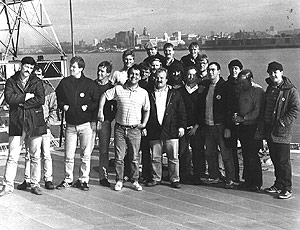
| HOME |
| NERVE |
| REVIEWS |
| ARCHIVE |
| EVENTS |
| LINKS |
| ABOUT US |
| CONTRIBUTORS |
| BACK ISSUES |
| CONTACT US |
Back to index of Nerve 11 - Winter 2007
 Rough Justice
Rough Justice
Rough Justice is a new political drama telling a tragic yet inspiring real life story of a group of men from the Cammell Laird shipyard in Birkenhead who were sent to jail for defending their right to work.
In 1984, during the height of her assault on the working classes, Mrs Thatcher was intent on smashing the power of the trade unions. After taking on the railways, the print workers, the car industry and the miners she turned her pernicious attention to the shipbuilding industry.
In May, compulsory redundancies were announced at Lairds, so the workers, defending their right to work and the future of British shipbuilding, voted for industrial action.
The dispute went on for almost six months with a core strike force of 37, the workers occupying a gas rig and later the gantry to the Type 42 Naval Destroyer, HMS Edinburgh. With no end to the dispute in sight the men were threatened with an SAS style assault to re-take the rig. Fearing a loss of life the striking men were forced to relent and walked off, then were dragged away and bundled into waiting police vans.
They were tried in their absence under a 15th century Trespass law, and the 37 were incarcerated for a month in the notorious Walton maximum-security prison.
They received no redundancy, no pension and have never worked in the shipbuilding industry again.
"It was a gross miscarriage of justice," declared Screenplay writer Mark D. Yates. Originally from Birkenhead, Mark explains, "About 16 months ago I briefly caught an item on Granada Reports featuring then Prime Minister Tony Blair at a GMB union conference holding up a t-shirt bearing the slogan JUSTICE FOR THE CAMMELL LAIRD 37, and I thought, 'that's interesting' as my mum used to be the nurse there and my cousin had worked there." Mark decided to do some research, got in touch with Dave Hulse at the GMB, who put him in touch with Eddie Marnell, a steward involved in the dispute who is still actively fighting for justice.
"The more Eddie filled me in on the details the more apparent it became to me that this was a classic dirty tricks campaign" says Mark, adding, "You've got to remember that this was in the shadow of the miners’ strike and Militant was running Liverpool, so Thatcher could do without another episode."
Mark approached the GMB for funds to set up a writers' initiative group, which included many of the men who were jailed providing important research information.
Work began on a script using Liverpool based Tubedale Films.
Mark says, "We have put together a good dynamic piece of art. It's got drama, political subterfuge and of course, humour. Even Derek Hatton and Tony Mulhearn are portrayed in a positive light, for a change, because of the help they gave behind the scenes, especially with the wives."
With a cast of local actors including David Morrisey, his brother Paul and Dean Sullivan and the involvement of experienced directors and producers, filming is now getting under way and Rough Justice should be ready for a cinematic release by October 2008.
Sorry Comments Closed
Comment left by james cluskey on 5th August, 2008 at 20:56
full scripts of this load of shite need to be made available asap as legal advice is being sought and action /injunctions will follow
make sure the full story is told
justice for the twelve apostles
is this the dirty dozen you refer too
Comment left by johno on 27th May, 2012 at 10:53
one of the main features of the dispute is the convenors 2 stanton brothers and joey santamaria? along with fellow workmates that had had enough blarney and mooshine took most of the initiative without union blessing, consent or support and it was supported by the communities and activists not union bureaucrats who at all times told them to come down and talk it isnt good to talk at all especially with bosses
Comment left by Check the Facts on 18th October, 2012 at 0:08
Never let the facts get in the way of the true story. The mass meeting had voted against striking and industrial action and therefore the action taken was UNLAWFUL, neither voted for by the company employees and consequently could not therefore be supported by the full time trade union officials. That's why 2000 people walked back into work past an UNOFFICIAL picket lne in October 1984 after suffering 12 weeks of lost income thanks to these 37 cretins.